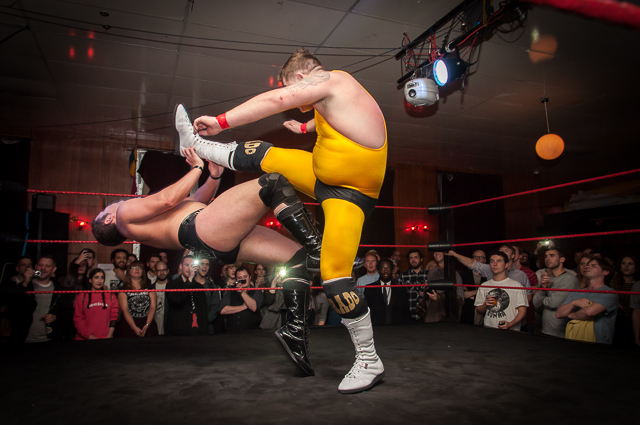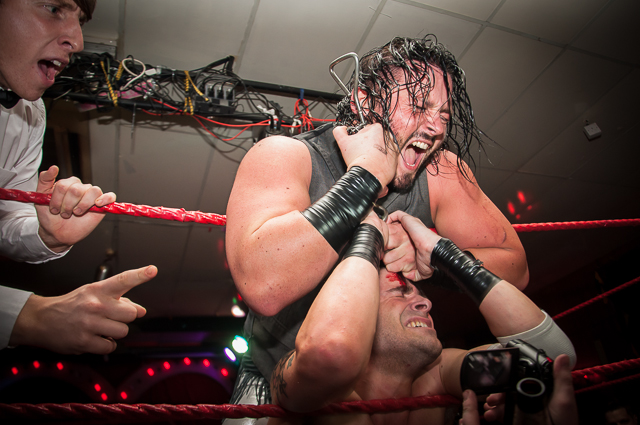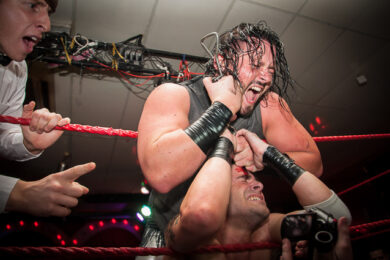On September 28 1986, the British wrestling scene, for so long a staple of the Saturday afternoon sporting schedule, vanished from television sets.
In the UK there is little or no money in wrestling. The promotions across the country operate on shoestring budgets, ebbing and fading like the tide, and payment is often a bonus, but never a certainty.
It hurts. One of the inevitable risks of performing in a ring with the lower end of an already limited talent pool is that injuries, and often very serious ones, can be sustained if the most innocuous moves are not performed correctly. Even in the heyday of British wrestling and at the top of the sporting ladder, injuries and even deaths occurred.
It is dimly viewed. Very few people, even among fans of the American variety, take local wrestling in any way seriously as a medium of entertainment, let alone appreciate its melting pot of physical prowess, showmanship and often bizarre talent on display.
In other countries, the USA in particular, wrestling is a high school and college pursuit that can grant access to lucrative scholarships and athletic recognition. As a result the world of pro wrestling (that which we see on the TV and which is roundly lambasted by humourless bores and the unenlightened as ‘fake’) is a natural pursuit. After all, it can provide the ultimate rewards of fame and fortune that far surpass those available via the world of athletics. So great are the rewards, and so glamorous and glossy the presentation, that the profession is pursued by all manner of people from every background imaginable.
In the UK on the other hand, the lot of a wrestler is a thankless one, with only a precious few making a handsome living and then only doing so by pursuing their dream in North America and/or Japan.
Of course the truth behind the immaculately depicted, almost super-heroically pantomime world of American wrestling is somewhat less salubrious than the world it portrays. At one time the wrestling business was closed and fiercely protective of its arts, but the advent of new media in the 1990s made maintenance of the veil increasingly difficult. In his 1999 behind the scenes documentary Beyond The Mat, filmed just as the fourth wall of pro-wrestling in the USA was beginning to crumble, Hollywood screenwriter Barry Blaustein captured on film a horrifically depressing yet compulsively and magnetically watchable snapshot of the life of once-superstar Jake ‘The Snake’ Roberts.
Roberts’s instinct to tell stories and perform ensured that his personal tale of crack, incest, sexual deviancy and excruciatingly dysfunctional family dynamics formed the keystone of the film’s arc. In the same film the legend Mick Foley discussed why engaging in barbed wire matches and leaping from a 15 feet high cage to crash through an announcers’ table, rendering him temporarily unconscious in the process, was part and parcel of his chosen form of creative expression. Later the terrified expressions of his wife and two small children are the focus of Blaustein’s camera as the staggering and profusely bleeding Foley is repeatedly struck over the head with a chair by fan favourite The Rock. In these cases, both wrestlers made enormous amounts of money during their careers and both had wildly contrasting lives outside of the squared circle. Roberts would go on to a sordid life of wrestling in backwoods town halls, crack smoking and, after moving to Britain, appearances on Trisha and prosecution by the RSPCA for cruelty to animals. Foley, by contrast, would become a multiple New York Times best-selling author, raise millions of dollars for charity and even branch out into stand-up comedy.
Blaustein’s success in breaching the wall of plausible deniability surrounding pro wrestling at that time was remarkable, as was Paul Jay’s intimate examination of the then-most popular ‘face’ in the world of wrestling, Bret ‘The Hitman’ Hart. Wrestling With Shadows was filmed over 1997-98 and covered from the inside (at least from Hart’s perspective) one of the most infamous and controversial events in pro wrestling history, the Montreal Screwjob. Both films managed to get inside the business in a way that no documentary had ever done previously, or since, and were brilliantly compelling in their portrayals of murderous gangsters and English teachers turned hardcore wrestlers, and studies of wrestling dynasties that revolve around 75 year-old men capable of making regular tough guys quite literally squeal like pigs as they are forced to wear their knees as ear muffs.
Other efforts were similarly entertaining but for different reasons. Blaustein and Jay are confirmed and avowed wrestling fans whose reverence for the business and the performers directly impacted upon the rawness of their films in an unexpectedly positive way. In short, they knew the score, as did the vast majority of the fans, so did not need to ask the ‘question’, therefore the wrestlers focused upon made no effort to obfuscate details around the inner workings. Had they done so, then the result would have been far less candid, as demonstrated by humourless roid-rage nutjob DeWayne ‘Sarge’ Bruce in Louis Theroux’s wrestling episode of Weird Weekend.
When asked by Theroux to what degree the results of matches are worked out in advance, the journalist’s ill-advised opening gambit, The Sarge turned several shades of beetroot and twitched like a corpse attached to a faulty defibrillator before making his excuses and leaving. He would exact revenge for this perceived insult to his manliness and athletic prowess later, making Theroux pay for this act of disrespect by beasting him like a government mule during a hellish day of humiliation and vomiting at The Powerplant wrestling school.
Of course The Sarge may have been a rare case. Even WWE superstar Dave Batista would later describe him as a ‘total piece of shit’ with ‘Napoleon Syndrome’. Nevertheless there was a time when even mentioning the worked nature of pro wrestling was viewed as a crime by insiders and acts of disrespect to performers, most of whom were not muscle-bound freaks but genuine hard cases, were poorly tolerated. Simon Garfield’s fantastic 1995 book The Wrestling collects numerous anecdotes from British wrestlers, but none as chilling as the tales of Les Kellet. Known as a tough but loveable clown by audiences, his true nature was somewhat more complex, as experienced directly by a ‘disrespectful fan’ placed in a headlock by Kellet in the dressing room and pushed face-first and screaming against an electric fire.
Sadly there have been few attempts to film the experiences of performers and promoters on the British scene, but recently Vice UK hit upon Scottish promotion Insane Championship Wrestling. ICW is one of the few modern UK promotions to have made it onto TV schedules, albeit hidden away on a little-viewed satellite channel from which they have since been dropped for being too violent and offensive.
The result of Vice’s efforts is The British Wrestler, an infuriatingly brief but tantalising glimpse into the UK scene largely from the perspective of a handful of ICW performers but with a more protracted focus upon aspiring wrestler Grado in the run up to the biggest match of his life. Grado is a diehard wrestling fan whose chief ambition is to live the dream of the professional wrestler. Of course the dream is on a sliding scale with ‘The Rock’ style superstardom off at the distant end. Grado may dream but he is realistic in his ambition and recognises that the near end is simply to get in the ring and perform before a crowd of drunken, lairy Scottish clubbers wearing a tight leotard, grapple a sweaty bloke in pants and, most importantly, not blow any moves.
As the heart of the film, Grado’s honesty, heart and warmth contrast harshly with some of the other, more jarring aspects of ICW. Between the potty-mouthed and faux-rage filled promoter/owner Mark Dallas to the NED-inspired Bucky Boys and their troublesome date-rape jokes one might be tempted to dismiss ICW and the film itself as a sneery, dim-witted ‘What the Butler Saw’ window upon how the other half live, to be viewed from the safety of your laptop. Unfortunately that would diminish further the already-fractured story on show, which is one of genuinely talented people pursuing a passion for the athletic, bizarre and ostentatious form of drama that is pro wrestling.
The true story behind British wrestling is yet to be told but the film’s official launch last week was a further opportunity for ICW to gain exposure. In a ring in a damp function room in Bethnal Green Working Men’s Club an invite-only audience awaited the spectacle of mano a mano pugilism, most never having seen such an event up close and in the flesh. The ring seemed an incongruous fixture with one side buttressed by a stage complete with a love heart entrance for the strippers that more commonly tread the boards there. Above the ring the lighting rig illuminating the stage, barely clear of head height, ensured that suplexes would be restricted to one half of the ring only. As showtime approached the nervous giggling and rhubarbing of the packed crowd of around 100 turned to a cheer when owner Mark Dallas entered the ring to thank Vice and introduce the evening’s action.
For a split second he seemed to be entering into a genuine monologue regarding the state of the British wrestling scene, before drunkenly rambling about how crap it was thanks to misspelt wrestling trunks worn by someone he apparently didn’t like very much. A shame as the experiences of a promoter on the UK scene and his perceptions of the failures of the business to expand over the years would have been infinitely more interesting than a profanity laden tirade. Fortunately he made himself scarce as returning wrestler Rob Cage, back after a six month injury lay-off, interrupted proceedings accompanied by a gimp, an over-stimulated chimp and the sweet sounds of Phil Collins. The Yorkshireman proceeded to insult the audience, his opponent and London in general, effectively setting up a rapturous welcome for the man of the hour, Grado, who entered the London scene for the first time to a hero’s welcome from the appreciative crowd. Cage and Grado’s physical prowess, matched by their sheer showmanship, won the day for Dallas, for Vice and for British wrestling. Despite the fact that the event lost steam, thanks largely to a 45 minute break before the next match, causing the crowd to dwindle somewhat, the audience had experienced twenty minutes of theatre immaculately performed by men in tights. Throughout, they booed, cheered, gasped, laughed and smiled, and for the most part they did so without a shred of irony.

The British scene is littered with performers of similar talent who, just like pub bands, continue to pursue their passion for little reward beyond the joy of performing and engendering a reaction in their small audiences. Wrestling could be snobbishly described as a low form of theatre, but it is also one of the purest forms of expression. Vice’s The British Wrestler is an all too brief but very welcome window into their world, but if you respond to it, it will undoubtedly leave you hungry for more.
Evidently ICW’s aggressive style and niche appeal is not the answer to British wrestling’s problems, but in Grado they are promoting a performer that satisfies many of the requirements for a form of wrestling entertainment with genuinely broad appeal. He is the ultimate cipher through which to channel the audience’s desires, an (outward appearance-wise) un-athletic, unlikely underdog pursuing his passion with a winning combination of rough-edged charm, charisma and sheer physical effort. Not to mention a rocking yellow leotard and possibly the most unlikely theme to ever grace a wrestler’s entrance in Madonna’s ‘Like a Prayer’.





